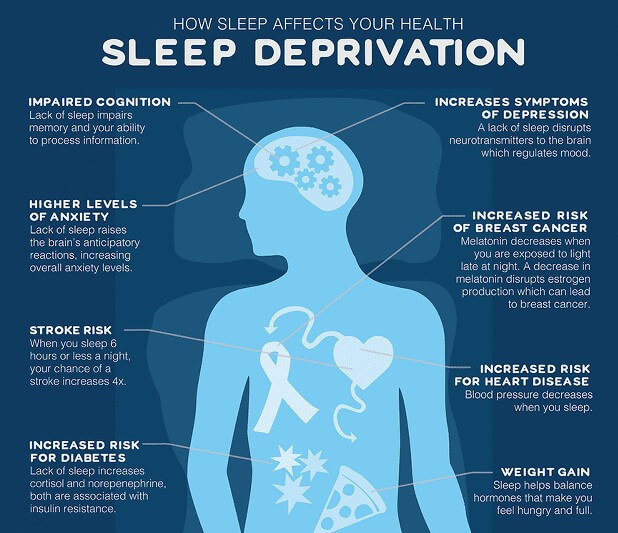Getting enough sleep is crucial for overall health and well-being. It supports proper brain function, physical health, and emotional well-being, making it an essential part of a healthy lifestyle.
In our fast-paced and demanding world, sleep often takes a backseat to other priorities. Many people consider it a luxury, rather than an absolute necessity. However, the importance of sleep cannot be undermined. It is a fundamental biological process that plays a vital role in maintaining optimal health and functioning.
Sleep allows our bodies to rest, repair, and regenerate, ensuring we wake up refreshed and ready to take on the day. Without sufficient sleep, our physical and cognitive abilities suffer, leading to decreased concentration, impaired memory, mood disturbances, and heightened stress levels. We will explore the myriad benefits of quality sleep and why it should be a top priority in our lives.

Credit: www.atriummednyc.com
The Benefits Of A Good Night's Sleep
Getting enough sleep is essential for maintaining optimal physical health, cognitive function, and emotional well-being. Sleep plays a crucial role in allowing our bodies to repair and rejuvenate. It strengthens our immune system, helping us fight off illnesses and diseases. Good sleep also promotes healthy growth and development, especially in children.
Furthermore, a restful night's sleep enhances our cognitive abilities. It improves our focus, attention, and memory, enabling us to perform better in tasks that require mental effort. Sleep also boosts our problem-solving skills and creativity, allowing us to think more critically and creatively.
Not only does sleep benefit our physical and cognitive health, but it also positively impacts our emotional well-being. Lack of sleep is often linked to increased stress, anxiety, and mood swings. On the other hand, a good night's sleep can improve our mood, increase happiness, and reduce the risk of developing mental health disorders.

Credit: anchorednutritiontherapy.com
Factors Affecting Sleep Quality
Stress and Anxiety:
Stress and anxiety often contribute to poor sleep quality. Our minds can become overwhelmed with thoughts, worries, and fears, making it difficult to relax and fall asleep. It can also lead to waking up frequently during the night, disrupting the sleep cycle. Managing stress through relaxation techniques such as deep breathing, meditation, or gentle exercise before bed can greatly improve sleep quality.
Poor Sleep Habits:
Engaging in unhealthy sleep habits can hinder quality sleep. Irregular sleep schedules, staying up late, and excessive daytime napping can throw off our body's natural sleep-wake cycle. Additionally, stimulants like caffeine and nicotine, heavy meals close to bedtime, and electronic screens can negatively impact sleep. Establishing a consistent sleep routine and creating a sleep-friendly environment can help promote better sleep.
Environmental Factors:
The environment we sleep in plays a significant role in sleep quality. Noise, temperature, and light can disrupt our sleep patterns. Loud sounds, extreme temperatures, or bright lights can make it challenging to fall asleep and stay asleep. Creating a calm and comfortable sleep environment by using earplugs, adjusting the room temperature, and wearing an eye mask can improve our chances of getting a restful night's sleep.
Tips For Better Sleep
Establishing a consistent sleep schedule is crucial for a good night's rest. Try going to bed and waking up at the same time every day, even on weekends. This helps regulate your body's internal clock and ensures a more restful sleep.
Creating a relaxing sleep environment is also essential. Keep your bedroom cool, dark, and quiet. Consider using earplugs or a white noise machine to block out any unwanted sounds.
Practicing sleep hygiene can significantly improve your sleep quality. Avoid consuming caffeine or nicotine close to bedtime, as these substances can interfere with sleep. Limit your exposure to screens, such as smartphones and laptops, before bed to avoid disrupting your body's natural sleep-wake cycle.
| Tips for Better Sleep |
|---|
| Establish a Consistent Sleep Schedule |
| Create a Relaxing Sleep Environment |
| Practice Sleep Hygiene |

Credit: www.afmc.af.mil
Frequently Asked Questions For The Importance Of Sleep
How Does Sleep Affect Our Overall Health?
Sleep plays a crucial role in maintaining our overall health. It helps to regulate our immune system, control appetite, improve cognitive functions, and promote healthy metabolism. Lack of sleep can lead to increased risk of various health issues such as obesity, diabetes, heart disease, and weakened immune system.
How Many Hours Of Sleep Do Adults Need?
Most adults should aim for 7 to 9 hours of sleep each night. However, individual sleep needs can vary based on factors like age, lifestyle, and health conditions. It is important to prioritize quality sleep and listen to your body's needs to ensure optimal health and well-being.
What Are The Consequences Of Sleep Deprivation?
Sleep deprivation can have serious consequences on our physical and mental health. It can lead to decreased alertness, impaired memory and cognitive functions, weakened immune system, increased risk of accidents, weight gain, mood swings, and a higher likelihood of developing chronic health conditions such as diabetes and heart disease.
It is important to prioritize sleep for overall well-being.
Conclusion
Inadequate sleep can have detrimental effects on our physical and mental well-being. It affects our cognitive functions, immune system, and overall quality of life. Prioritizing sleep is crucial for maintaining good health and productivity. By implementing simple lifestyle changes, such as establishing a consistent sleep schedule and creating a sleep-friendly environment, we can reap the numerous benefits that come with a good night's rest.
Start valuing sleep as an essential component of a healthy lifestyle and witness the positive impact it has on your life.
Comments
Post a Comment